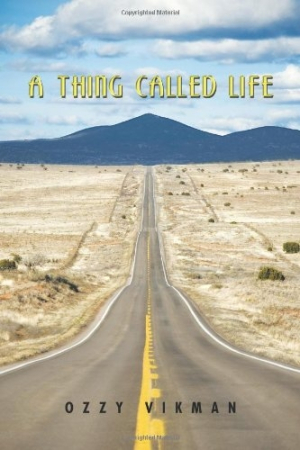A Thing Called Life
Finnish-born businessman Ozzy Vikman uses poetry to make sense of the world. The poems in A Thing Called Life show readers that tough people can outlast tough times if they stay positive and focus on the light at the end of the tunnel. Tackling universal themes such as pain and love, the short, accessible poems ask readers to celebrate “a thing called life,” and to do more and live better.
Vikman’s poems take on heavy subject matter. The titles are often matter-of-fact, such as “Scars,” “Afraid,” and “Lost.” The simplicity of the forms and language makes their messages accessible to a broad audience. The poems pose challenging questions. In “How,” Vikman asks, “how can you understand me / when you ain’t even listening.” Other poems use repetition to convey the speaker’s pain or grief. Each line in “Too Late” begins with the phrase “I should.” When Vikman suddenly veers from the repetition, the reader feels the full weight of the statement, “but now it’s too late / too late.” Though the poems in his collection do not have rhyme schemes, Vikman has a strong sense of line—each break tells a story. In “Irony,” the poem opens with “Deep are the valleys we walk through / and high are the mountains we climb in life.” The strong end words and the movement in each line mimic the described movement.
Vikman speaks from the heart, asking readers to act today rather than put things off for tomorrow. However, a lot of contextual information lurks beneath the surfaces of the poems: In “Messed Up,” for example, Vikman references how the speaker “messed it up / and threw it all away,” and in “Locked Up” the speaker explains how he or she never gave up hope even while locked “in the little cage.” These poems do not explain who messed up, what the crime was, or where the foundation of this hope resides. Still, the earnestness of the pieces makes the poems emotionally moving. Readers expecting full stories or lyrical prowess will be disappointed in Vikman’s collection. This lack of background information means that the reader cannot fully participate in the poems’ reflections. Varied forms or more sound play may have fleshed out the metaphors.
Redemption is a recurring theme in A Thing Called Life. Each poem’s speaker is asking for a new lease on life. Penance is uncertain, but hope is present. Anyone struggling with uncertainty or past mistakes will find solace in this collection. Vikman wears his heart on his sleeve, his poetry reminding readers that they need to “go thru / the darkness / in order to enjoy the sunshine.”
Reviewed by
Lisa Bower
Disclosure: This article is not an endorsement, but a review. The publisher of this book provided free copies of the book and paid a small fee to have their book reviewed by a professional reviewer. Foreword Reviews and Clarion Reviews make no guarantee that the publisher will receive a positive review. Foreword Magazine, Inc. is disclosing this in accordance with the Federal Trade Commission’s 16 CFR, Part 255.

